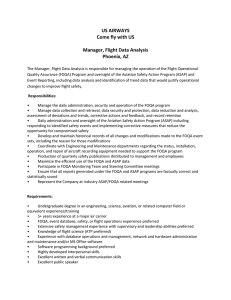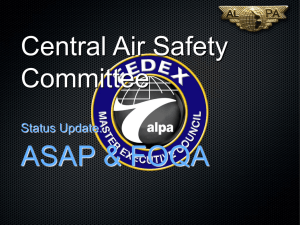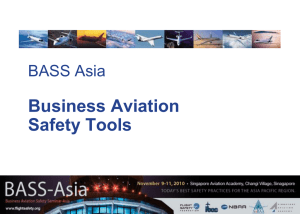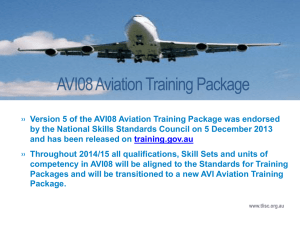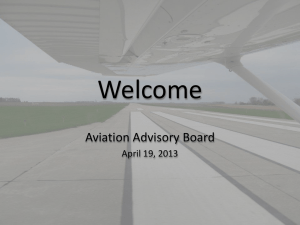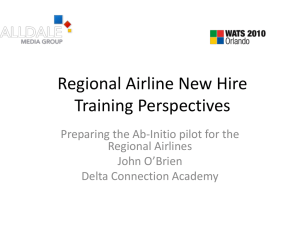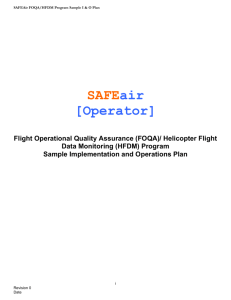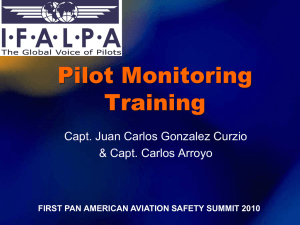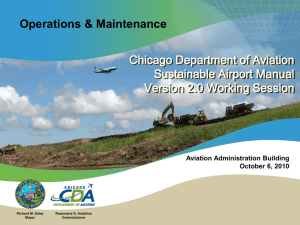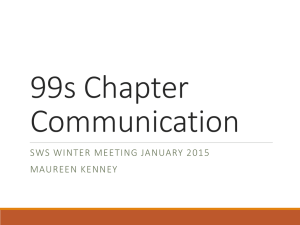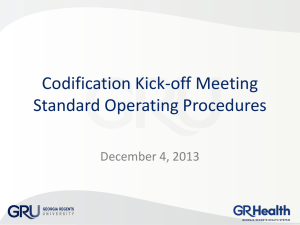PowerPoint - Northern California Business Aviation Association
advertisement
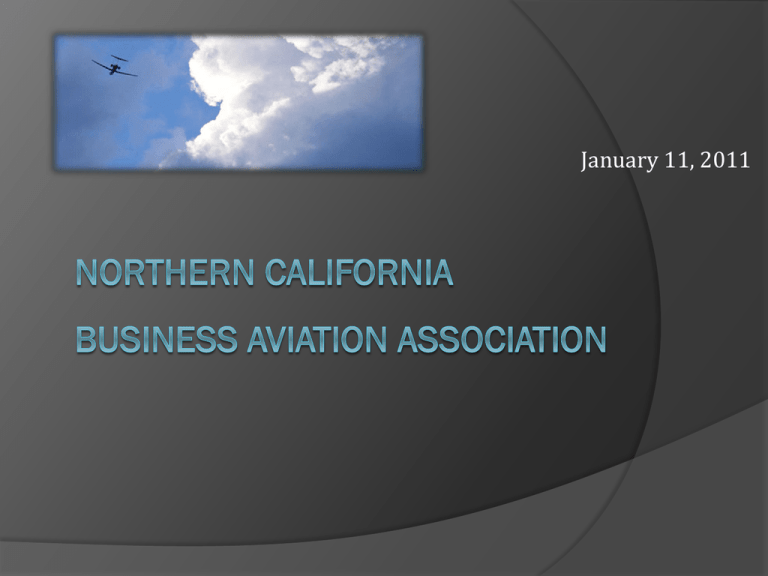
January 11, 2011 WELCOME INTRODUCTIONS John Swaney, Chief Pilot, HP Aviation Bill Hunter, ACM Aviation; Administrator Stephen Harms, Safety Officer, HP Aviation; FOQA Presenter Board of Directors Robert Pocica, McKesson Brian Adamcik, Marmalade Skies John Swaney, HP OBJECTIVES Regional advocacy for business aviation Aviation safety Mentoring and development of business aviation professionals COMMITTEES Advocacy: NCBAA Board Safety: Steve Harms, Chris Vedo, Ed Wetzel Mentor (Scholarship): Shannon Roth, Herv Hodgson, Ron Freswick, Victoria Collom (SJSU) Administration: Bill Hunter (luncheon, meetings, membership, web site), Sterling Brandt (Sharepoint, NCBAA intranet) Corporate Flight Operational Quality Assurance Presented by: Stephen Harms steve.harms@hp.com C-FOQA Recording DFDR supplies the data stream Quick Access Recorder (QAR) records data stream on a scandisk card Data is transmitted to FDS for processing Pilots provide supplemental data about events C-FOQA Benefits SMS program enhancement IBAC recommendation Insurance rate reduction Data Review FOQA events are reviewed by the Safety Officer for the following issues: Safety SOPs Training Flight Standards Quality Assurance Maintenance The Basics Review process must be fair and just! Data must be used in a non-punitive environment! Review process must not fall into the blame culture that often permeates our industry! FOQA Will Identify Safety Problems Pilots provide only subjective data based on their perceptions and experiences and often report this only when absolutely necessary FOQA reports objective, quantitative data on what occurred during a flight FOQA yields precise, unbiased information for evaluation FOQA is not based on just perceived problems or risks; it looks at all parameters Big Brother? Perhaps FOQA is used to identify suspected problems Unknown problems! FAR, AFM, SOP noncompliance Resulting in a proactive safety culture to facilitate fixing problems before they become critical through : Training SOPs Engine and systems monitoring Chief Pilot Issues Identified by C-FOQA FAR violations Non adherence to SOPs Non adherence to AFM/AOM Flying outside the box Rogue behavior Sloppy flying (training/performance issues) ○ Speed control ○ Bank control ○ Pitch control ○ Non stabilized approach Stabilized Approaches TOD ROD below 1000’ AFE LOC/GS/GP tolerances EGPWS alerts Secondary flight controls over speed High energy approach and landings Long landings High energy braking Event Review Process Safety Officer receives an e-mail generated by FDS with the basic details of an event Service provider web site expands on the event FOQA data is then reviewed event by event for outliers and trends Events are broken down into seconds pre and post Pilots are expected to file an outlier event report Generally they will beat themselves up, they get it Others seem oblivious, they need to get it A peer (line pilot) will then hold an interview if appropriate If a serious event occurs or there is a stalemate the Chief Pilot will take over Events Nov FOQA 2010 High Bank Angle 1 Level Bust 1 Loc Dev 1 GS Dev 1 GPWS 1 Long Flare 1 High ROD < 1K 1 High ROD 4 HS Flaps 20 1 Pitch Low climb 4 Pitch Low TO 1 Pitch Low Apph 5 0 1 2 3 Number of Events 4 5 6 Protections All data is de-identified Ops Managers do not have open access to the individuals involved Only 3 people have access to the actual event data at HPA Outliers are generally verified by the service provider NASA Gulfstream V Events.pdf Room Introductions Name Company Title NEXT MEETING Tuesday, February 8th 11:30am – 1:00pm Michael’s Restaurant at Shoreline 2960 Shoreline, Mountain View Phone: (650) 962-1014 Contact: John Swaney ○ Phone: 408-291-2320 ○ Email: john.swaney@hp.com
